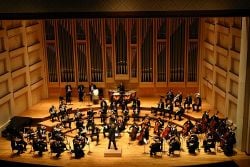Difference between revisions of "Info: Video Test" - New World Encyclopedia
From New World Encyclopedia
Svemir Brkic (talk | contribs) |
Svemir Brkic (talk | contribs) m (Svemir Brkic moved page Info:Main Page2 to Info:Main Page Test without leaving a redirect) |
(No difference)
| |
Revision as of 18:42, 25 July 2023
New World Encyclopedia integrates facts with values. Written by certified experts.
Featured Article: Classical music
The appellation "Classical music" is a broad, somewhat imprecise term in referring to music produced in, or rooted in the traditions of, Western art, ecclesiastical and concert music. The central norms of this tradition reached their heights of complexity and development in the period between 1550 and 1900 with composers such as Haydn, Mozart, and Beethoven. Beginning in the Baroque era (1600-1750) expressing moods and emotions (affectations) via tonal logic and organizational structure became important concerns for composers. In addition a belief in the moral and ethical aspects of music became a concept that many composers adhered to.
Popular Article: Battle of Normandy
The Battle of Normandy, codenamed Operation Overlord was the Allied invasion of Normandy, part of the Normandy Campaign. It began on June 6, 1944 (commonly known as D-Day), and is held to end on June 30, 1944, with Operation Cobra. Allied land forces that saw combat in Normandy on D-Day itself came from Canada, the United Kingdom and the United States of America. Substantial Free French and Polish forces also participated in the battle after the assault phase, and there were also contingents from Belgium, Czechoslovakia, Greece, the Netherlands, and Norway. Other Allied nations participated in the naval and air forces.
Did you know?
Romanticism, popular from the late eighteenth century through the nineteenth century, emphasized emotion and imagination in contrast to reason that was the focus of the Enlightenment (source: Romanticism)

